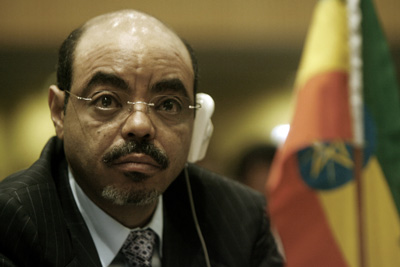How can an Ethiopian reporter cover the activities of Ethiopia’s leading opposition figure, Berhanu Nega, or an attack by the Ogaden National Liberation Front (ONLF) rebels without risking prosecution and a 20-year prison sentence? Such questions have haunted Ethiopian journalists since a far-reaching anti-terrorism law came into effect in 2009. The law criminalizes any reporting authorities deem to “encourage” or “provide moral support” to groups and causes the government labels as “terrorists.”
Recently, a day after a fly-by visit in the Ethiopian capital of Addis Ababa by U.S. Secretary of State Hillary Clinton, the Ethiopian House of Peoples’ Representatives (where the ruling EPRDF controls 99.6 percent of the seats) formally designated five groups as terrorist entities, pursuant to a power conferred on the chamber by the anti-terrorism law, according to local journalists. The list comprised Al-Qaeda and the hard-line Somali Islamist militant Al-Shabaab, the Ethiopian separatists groups ONLF and the Oromo Liberation Front (OLF), but also Ginbot 7, a banned political party started by U.S.-based opposition leader Nega.
Ethiopia is a country whose relative stability in the troubled Horn of Africa region is in great part maintained by repression of dissent and ever-increasing restrictions on the freedom of the press. It receives praise and assistance for its participation in U.S. counterterrorism in Somalia, but for Ethiopian journalists, reporting on terrorism (as defined by their government) without risking jail time has become too risky.
“The irony is, the government may pride itself on its efforts to fight terrorist groups, but we [reporters] will think twice before writing about it,” said a local journalist who requested anonymity for fear of government reprisals.
“At this point, any Ethiopian opposition member living abroad is a terrorist, along with Al-Qaeda, and we sure as hell won’t interview them,” said another local reporter who requested anonymity for security reasons.
“If a reporter writes anything, except clear denunciation about these organizations, she or he is taking the risk of any interpretation,” journalist Mesfin Negash told CPJ. Until November 2009, Negash was the managing editor of the leading weekly Addis Neger, whose staff fled the country after columns in the state daily Addis Zemen accused the paper of promoting anti-constitutional groups by covering Ginbot 7 activities. This week’s categorization will help recast a pall over any critical reporting in the country.
The Ethiopian government has long considered the ONLF, OLF, and Ginbot 7 terrorist outfits and also targeted international media for providing coverage. In 2009, the Ethiopian government went as far as accusing the Kenya-based broadcaster Nation Television (NTV) of giving a platform to terrorist groups in the Horn of Africa for airing a report on the OLF. In 2008, authorities accused Qatar-based satellite network Al-Jazeera of “direct and indirect assistance to terrorist organizations” over an exclusive report on the ONLF. In 2007, three New York Times journalists were detained for five days for reporting on the ONLF.
To exiled Ethiopian blogger Kiflu Hussain, the risk of retroactive persecution or prosecution on previous coverage poses another threat to journalists. “Anything ever written about these now outlawed groups could be fair game,” said Hussain, who lives in Uganda. “The ruling party is known for holding grudges and applying its draconian legislation retroactively to target its adversaries, real or perceived.”
